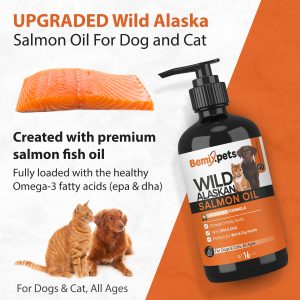Coconut oil has lots of great health benefits for us humans. It also has wonderful health benefits for our dogs. First, I need to mention that the main reason coconut oil is so good for people and dogs is that it contains medium-chain-triglycerides or MCTs. This is a special type of fat that helps you lose weight. MCTs have many other benefits as well. Let's look at them now.
Contents
What are the Health Benefits of Coconut Oil for Dogs?
Coconut oil is anti-everything, anti-bacterial, anti-viral, anti-yeast, anti-fungal, anti-inflammatory, anti-odor it's amazing stuff. But unlike an anti-biotic that you might get from the vet, coconut oil doesn't destroy all the bacteria in your dog's gut. Just the bad bacteria. This is a wonderful thing because the good bacteria of the gut make up about 80% of your dog's immune system.
Coconut oil is great for use on small cuts and wounds to prevent infection. This is due to its anti-bacterial and anti-viral properties. These properties also make it great for use in other topical applications, like to clean ears or eye. Melt the coconut oil so that it is liquid, but not hot.
The anti-inflammatory properties of coconut oil make it useful for healing the gut, fighting cancer, reducing the risk of heart disease, fighting allergies, and helping with arthritis pain. Coconut oil can be used to help alleviate the sore muscles of a canine athlete as well. Coconut oil is great for reducing inflammation in the body. The less inflammation your dog has the less likely he is to develop diseases.
Coconut oil can be used to help balance a dog with yeast infections as well as fungal infections. This is because of coconut oil's anti-yeast and anti-fungal properties.
Coconut oil helps to keep your dog's skin and coat healthy. You can use coconut oil orally for this purpose or use it topically.
If you choose to use coconut oil topically is can act as a flea, tick, and mite repellent. In addition, it's great for treating bites from these parasites!
This unique oil is also anti-odor and can help to reduce doggie breath. You can actually make doggie toothpaste out of coconut oil. It can also help with dogs that seem to have higher body odor.
Moreover, coconut oil is wonderful for bone health, weight loss, coughing, can help with cognitive function, is a great energy source, and can help to balance hormones and metabolism!
Are Ther Any Side Effects of Feeding a Dog Coconut Oil?
It is possible for some dogs to have an allergic reaction to coconut oil. But other then that, side effects are very limited. The main issues come from introducing coconut oil too quickly. This can result in diarrhea or loose, greasy stool.
To avoid this it is best to introduce your dog to coconut oil slowly. Build up to a full dose after a week or two.
One more thing to note is that if your dog has a history of pancreatitis you may not want to feed him coconut oil. The fat from the oil may cause stress on his pancreas. Talk to your vet if your dog has a history of pancreatitis or an inability to metabolize fat. Adding a few digestive enzymes to your dog's diet could help with these problems.
Other than those few things dogs of all sizes, breeds, and ages can enjoy this wonderful superfood of coconut oil!
So How Much Coconut Oil Should I Feed My Dog?
Start with giving your dog just a little lick off your finger, to see if he likes it or if he has a reaction. After that give ¼tsp of coconut oil per day. As you see that your dog is tolerating the coconut oil well, work up. The normal dose is 1tsp per 10 pounds of body weight. That's about 2T for a 60 pound Golden Retriever.
You can feed the coconut oil all at one time or divide the dose to a few times a day. Some dogs may be able to consume more coconut oil if you do not feed it all at one time.
To use coconut oil topically, apply a small amount to your hand. The heat of your hand will melt the oil. As the oil melts, gently massage it into your dog's fur. Let the coconut oil soak in for a bit and then you can rinse it out with warm water.
What is the Best Coconut Oil for My Dog?
Be sure to avoid coconut oils that have been refined, bleached, and/or deodorized. These are poor quality products and likely to do more harm than good.
When looking for coconut oil to buy it is best to get organic, extra-virgin or virgin, cold-pressed, and unrefined. A glass bottle is preferable. If you can find a coconut oil will all of these attributes you have found a coconut oil that will provide the most benefits for your dog.
How do I Feed My Dog Coconut Oil?
There are lots of coconut oil products on the market, some are made especially for dogs. You can find coconut oil in treats, oils, and as specialty salves and oils for healing. Some salves and oils are mixed with CBD oil, raw honey, or herbs. Thes can be particularly valuable if your dog is sick. Of course, just buying a high-quality coconut oil as discussed above is great too.
You can use coconut oil as a pill coating for your dog as well. I mean, why not hide the pill in a beneficial oil like coconut oil right?
Can Dogs Eat Other Coconut Products?
Yes, dogs can eat just about all coconut products. Well, not the hard rind or sweetened coconut products, these are best avoided.
Dogs can enjoy coconut meat, coconut milk, and coconut water. Coconut water is a great source of naturally occurring electrolytes. This makes coconut water a great choice for bringing along on a long walk in the hot summer months. Or bring it along to your canine sporting events. Be sure to get coconut water that is not sweetened or flavored, just plain coconut water is best.
Summary
Dogs, like humans, can reap the many benefits of coconut oil. Coconut oil is basically anti-everything, which is amazing! But be sure to introduce coconut oil slowly to avoid loose stool. Look for coconut oils that are unrefined and cold-pressed for maximum benefit.






Leave a Reply
You must be logged in to post a comment.